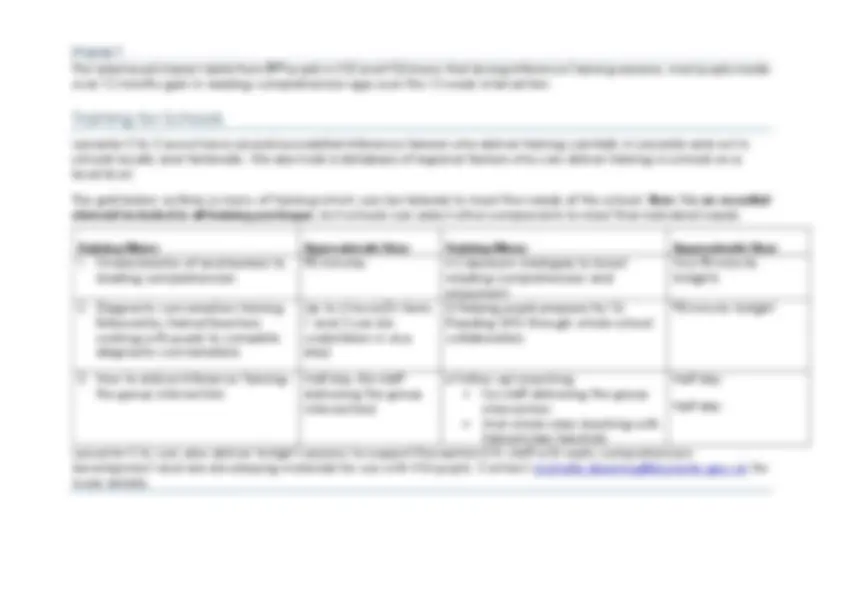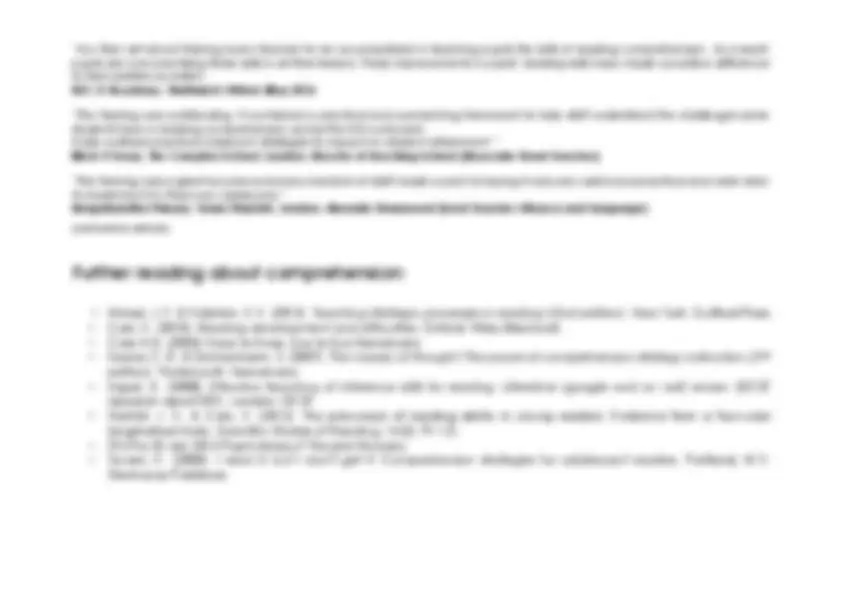





Study with the several resources on Docsity

Earn points by helping other students or get them with a premium plan


Prepare for your exams
Study with the several resources on Docsity

Earn points to download
Earn points by helping other students or get them with a premium plan
Community
Ask the community for help and clear up your study doubts
Discover the best universities in your country according to Docsity users
Free resources
Download our free guides on studying techniques, anxiety management strategies, and thesis advice from Docsity tutors
The Leicester City Inference Intervention has been evaluated by Professor Greg. Brooks as highly effective in the 2007, 2013 and 2016 editions of What Works.
Typology: Study notes
1 / 5

This page cannot be seen from the preview
Don't miss anything!




Our training materials contain engaging, professional development resources for school staff. Training sessions aim to improve adult awareness of the challenges some readers face across the curriculum, so that adults feel better equipped to help. It also includes a toolkit to have diagnostic conversations with pupils about texts to gain quick insights into what strategies pupils are using and neglecting.
The training draws on a range of up to date research and best practice regarding the class and group strategies likely to improve reading comprehension and enjoyment. Separate sections of the training materials address issues at KS1, KS and KS3. In secondary schools the training explores ways all subject teachers can work together to improve students’ metacognitive strategies across the curriculum which particularly benefits Pupil Premium students.
The training offers a group intervention for pupils who need extra support to recalibrate how they read. Inference Training , based on the work of Yuill and Oakhill, involves a teacher/teaching assistant having “instructional conversations” to help make comprehension strategies explicit. Four pupils work with an adult for 40 minutes, twice a week for 24 lessons. Through reading and interactive discussions, the group:
Our training materials include whiteboard resources for primary and secondary schools to use and a manual containing 75 text extracts with support notes for adults. The fiction, non-fiction and poetry texts include award winning titles which have been carefully chosen to offer rich conversation opportunities.
Costs of Inference Training The costs of the training are agreed locally. Schools undertaking the training will require at least one Inference Training manual @ £65 (plus postage), which contains 75 texts and resources. Once one manual has been purchased schools can order additional sets of the texts for the intervention @£15, via their trainer. It is useful for schools to know what the costs per pupil are for any intervention used. An Inference Training programme is 24 lessons, each taking 40 minutes. We estimate the cost of teaching the group intervention per pupil is around £130 if delivered by a Level 2/3 TA or £300 per pupil if delivered by a teacher. (Adults need 40 minutes teaching time for each lesson and 20 minutes for planning/ recording, so allow 22, one-hour adult sessions for a complete programme). Who to contact If you would like more information about Inference Training; would like details of central training or would like to find a trainer who can deliver sessions in your school contact: National Trainer: Michelle Deeming Email: michelle.deeming@leicester.gov.uk Phone: 0116 454 4650 Address: SEND Support Service , New Parks House , Pindar Road, Leicester. LE3 9RN Acknowledgements and feedback from schools Our professional development materials and class teaching approaches are based on a wide range of research and best practice including: Almasi and Fullerton, Clarke, Truelove, Hulme and Snowling, Didau, Cain, Oakhill and Elbro, Gunning, Keene and Zimmerman, Tovani, National Curriculum 2014 and OfSTED,. The group intervention: Inference Training was adapted from the work of Yuill and Oakhill by Tony Whatmuff, with acknowledgement and thanks to colleagues. " The importance of evidence based practice in education is receiving increased recognition. Inference Training has a firm grounding in both the research into reading comprehension and the theoretical bases of comprehension. The programme provides sound and innovative ways to support children's reading comprehension and teaches them strategies that can be applied not only in literacy lessons, but across the curriculum. " Jane Oakhill
‘You then set about training every teacher to be accomplished in teaching pupils the skills of reading comprehension. As a result, pupils are now practising these skills in all their lessons. These improvements in pupils’ reading skills have made a positive difference to their abilities as writers .’ KS3 /4 Academy, Northwich Ofsted, May 2016 “The training was outstanding. It contained a practical and overarching framework to help staff understand the challenges some students face in reading comprehension across the KS3 curriculum. It also outlined practical classroom strategies to impact on student attainment.” Mick O’Leary, The Compton School, London. Director of Teaching School (Associate Head Teacher) “The training was a great success and every member of staff made a point of saying it was very useful and practical and were keen to implement it in their own classrooms.” Bangabandhu Primary, Tower Hamlets, London. Amanda Drummond (Lead Teacher-Literacy and Language) (networker article) Further reading about comprehension: